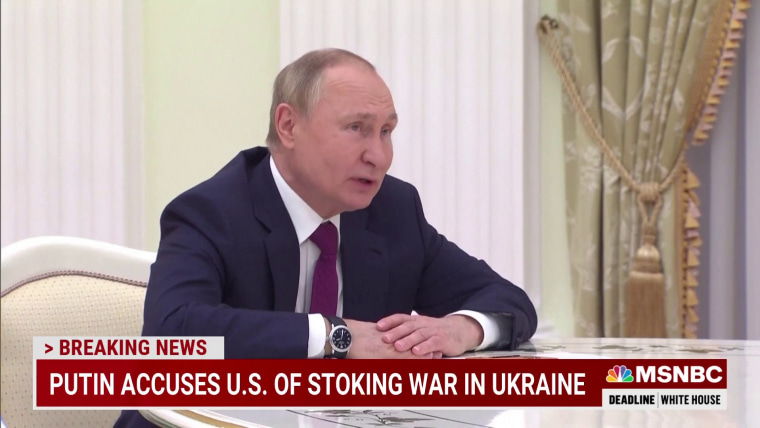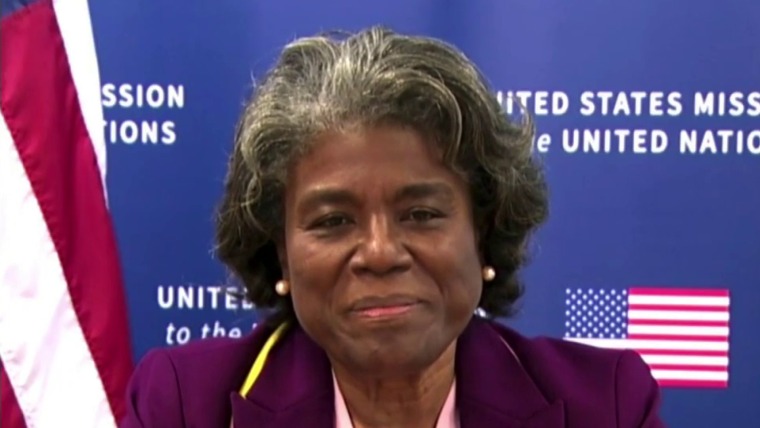The United Nations Security Council met Monday to discuss tensions between Russia and Ukraine that may or may not end with the former further invading the latter. The Security Council won’t be the place where the Ukraine crisis is resolved, though, especially if it escalates to open warfare — because that’s exactly how the system was designed.
The Security Council won’t be the place where the Ukraine crisis is resolved, especially if it escalates to open warfare.
The Russians objected to Monday’s meeting, forcing the council’s 15 members to vote on whether to discuss Ukraine at all — only Russia and China voted no. But, as Foreign Policy’s Colum Lynch noted, the meeting didn’t go as U.S. Ambassador to the U.N. Linda Thomas-Greenfield likely intended. While all the speakers urged diplomacy over conflict, the U.S.’s condemnations of Russian troop buildups weren’t echoed quite as loudly as Washington would have preferred. We’re still a long way from having “the world … speak out in one voice,” as President Joe Biden put it Monday in a statement.
That’s not a good sign for the already slim chance of the U.N. intervening in any potential invasion. It’s true that the U.N. was designed to act as a check on states willing to wage war against their neighbors. The classic example at this point is the council’s authorization of force to turn back Saddam Hussein’s Iraq after its invasion of Kuwait in the early 1990s. There’s absolutely no chance though for direct U.N.-authorized action to turn back any Russian aggression or multilateral economic sanctions like those that were levied against Iran’s nuclear program last decade.

During negotiations to establish the United Nations in the final years of World War II, the Soviet Union had a seat at the table as one of the Big Three, alongside the United States and the United Kingdom. (France and China round out the permanent five Security Council members we know today.) But the Russians were deeply wary about any constraints that the new international order would have on its own security. Being kicked out of the League of Nations in 1939 weighed heavily on Stalin’s mind as he grappled with whether to take part in the new organization President Franklin D. Roosevelt was advocating.
Part of the agreement hashed out during the Yalta meeting of the Allies in 1945 was that the Big Five members would get a veto over most Security Council decisions. So, while a simple majority could bring any issue to the table, as seen on Monday, any coercive action needs the unanimous approval of all five. It was an acceptable trade-off for Moscow’s negotiators, ensuring that the new organization could never be turned against the Soviet Union — or its successor at the U.N., the Russian Federation.
The U.N. Charter does say that countries that are party to a dispute — as Russia is here — have to abstain on any Security Council resolutions regarding peaceful settlement of the conflict. But as U.N. analyst Richard Gowan explains, that doesn’t necessarily mean there’s a clever way to dodge Moscow’s veto on Ukraine:
Neither the United States nor any of the other permanent five (P5) members of the Council are likely to want to create precedents for limiting their own veto powers in future, just to score what may amount to a symbolic point. Forcing Russia to veto a resolution – as the West has often done over Syria – would make the point equally clearly.
Making matters more difficult for U.N. diplomacy, Russia on Tuesday assumed the rotating presidency of the Security Council. That power means no amount of escalation will result in an emergency meeting of the council in the month ahead. And while the General Assembly, where every country has one vote, could condemn any Russian invasion of Ukraine, any solutions it offers would be nonbinding on Russia.
Which isn’t to say that the U.N. will be completely useless here. There’s definitely an element of public diplomacy involved in open Security Council meetings, offering a chance for member-states to blow off steam as Indiana University professor David Bosco has argued. We may be seeing the results of that given the renewed interest in diplomacy we’ve seen from all sides since the U.N. meeting.
But this all means that there will be no firm action at the United Nations on this front. And that is exactly what the Soviet Union wanted from its seat at the table. Their position both allows for collective action but guarantees that the U.N. can be blocked from doing anything that is not in Moscow’s own national interests.
There’s a reason that for all of the Russians' griping about the United Nations and infringements on their sovereignty, they never threaten to leave entirely. Instead, they know that it’s way better to be at the table with a veto than on the outside looking in. For fellow member states like Ukraine, though, that means that any promise of protection from aggression by the U.N. falls short when it’s one of the victorious World War II allies knocking at their door.

